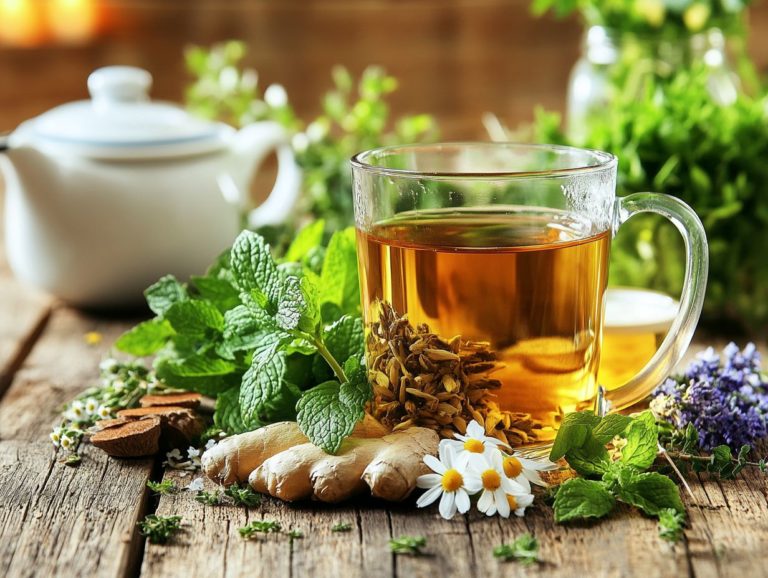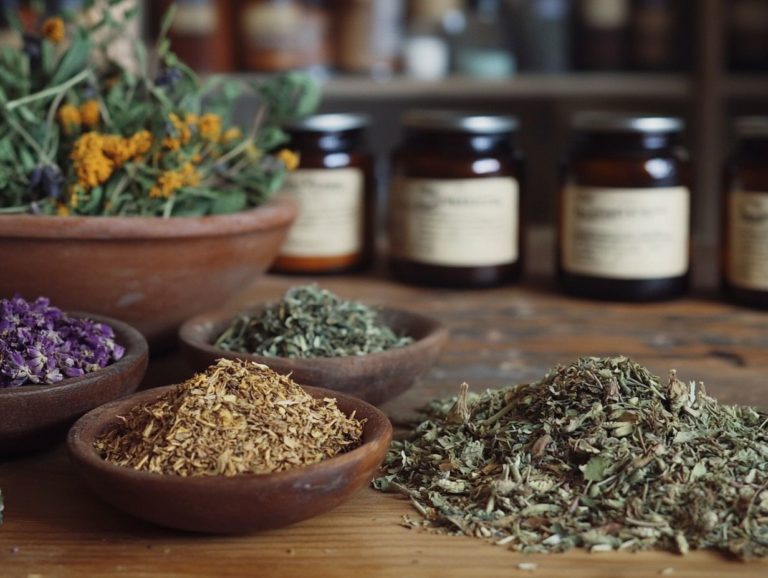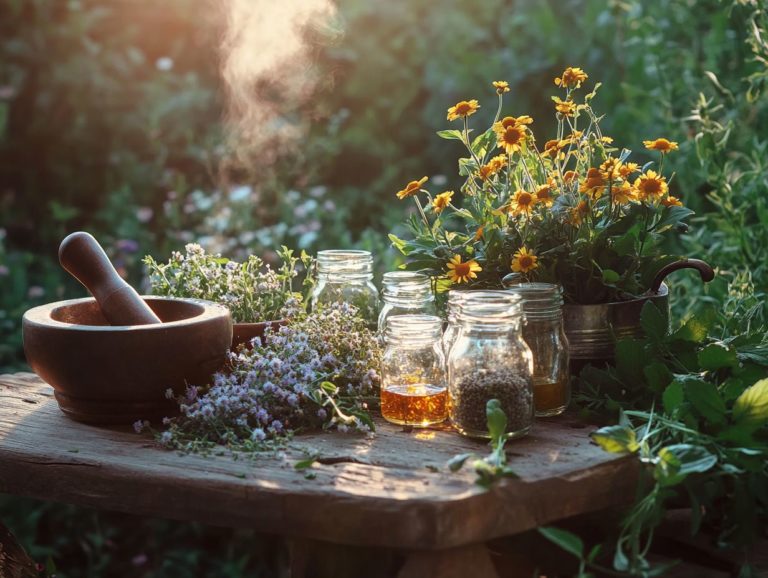What Are Herbal Remedies for Skin Conditions?
Herbal remedies are treasured for their natural ability to soothe and heal various skin conditions, including skin inflammation.
In this discussion, you ll explore common skin issues, their underlying causes, and discover how herbal treatments can offer relief. You will identify specific skin conditions and understand the benefits of effective herbs and medicinal plants. You ll also cover preparation and application methods that truly make a difference in skin care.
Let s explore safety first. It s crucial to know when to consult a professional about potential interactions with traditional medicines.
Start your journey toward healthier skin today by harnessing nature s bounty.
Contents
- Key Takeaways:
- Common Skin Conditions and their Causes
- Herbal Remedies for Skin Conditions
- Using Herbal Remedies for Skin Conditions
- Safety and Side Effects of Herbal Remedies
- Consulting with a Professional
- Frequently Asked Questions
- What Are Herbal Remedies for Skin Conditions?
- What Are the Benefits of Using Herbal Remedies for Skin Conditions?
- What Are Some Common Herbal Remedies for Skin Conditions?
- Are Herbal Remedies Safe to Use for Skin Conditions?
- Can Herbal Remedies Be Used for All Types of Skin Conditions?
- How Long Does It Take for Herbal Remedies to Work on Skin Conditions?
Key Takeaways:

- Herbal remedies can be effective natural treatments for common skin conditions like eczema, acne, and psoriasis.
- Some effective herbs for skin conditions include aloe vera, chamomile, and tea tree oil, each with their own specific benefits.
- Consult a professional before using herbal remedies for skin conditions, especially if you have any underlying health conditions or are taking medication.
What are Herbal Remedies?
Herbal remedies provide a natural solution drawn from the rich offerings of plants often used in traditional medicine. They possess remarkable healing properties for various skin conditions and other ailments.
The history of these remedies stretches back thousands of years. Ancient cultures acknowledged the benefits plants have for health. Today, these remedies are experiencing a resurgence as more individuals seek alternatives to synthetic ingredients.
Take Aloe Vera and Chamomile for example; their soothing and hydrating qualities make them ideal allies for anyone dealing with sunburn or dry skin. Turmeric, known for its anti-inflammatory and antibacterial properties, effectively addresses acne and fosters a more even complexion.
This renewed fascination with herbal extracts signifies a shift toward a more sustainable and natural approach to personal care, enabling you to nurture your skin with time-honored botanicals.
Common Skin Conditions and their Causes
You may encounter a range of common skin conditions, including acne, eczema (a condition that makes the skin red and itchy), dermatitis (inflammation of the skin), and rosacea (a chronic condition causing redness and visible blood vessels). These issues can stem from various factors such as genetics, environmental triggers, and lifestyle choices.
Each condition presents a unique set of symptoms, ranging from redness and inflammation to intense itching and irritation, ultimately affecting your skin tone and overall health. Understanding the underlying causes of these skin concerns is essential for effective treatment and management.
Whether you choose traditional medicines or herbal remedies that target inflammation and offer soothing benefits, understanding these factors can significantly enhance your approach to skin care. Incorporating 5 essential herbs for skin health can also make a notable difference.
Identifying and Understanding Different Skin Conditions
Identifying and understanding different skin conditions is essential for effective treatment, as each condition be it acne, eczema, dermatitis, or rosacea presents unique symptoms. Each requires tailored management approaches. For instance, you might find acne appearing as unsightly pimples and scars. Eczema, on the other hand, could leave your skin feeling dry and intensely itchy.
Knowing these differences helps you find the right treatments. Recognizing triggers associated with these skin conditions is crucial for both prevention and management. Factors like stress, allergens, and diet can significantly influence how your skin reacts. You may notice flare-ups of dermatitis after wearing specific fabrics or using certain skincare products.
By keeping a symptom diary, a journal where you note your skin’s reactions, you can pinpoint these triggers and make necessary lifestyle adjustments.
Beyond conventional treatments, herbal remedies such as tea tree oil and chamomile have shown great promise in soothing irritated skin. This shows why a holistic approach to skincare matters, combining awareness, lifestyle changes, and natural healing options for the best results. Start exploring these remedies today for better skin health!
Herbal Remedies for Skin Conditions
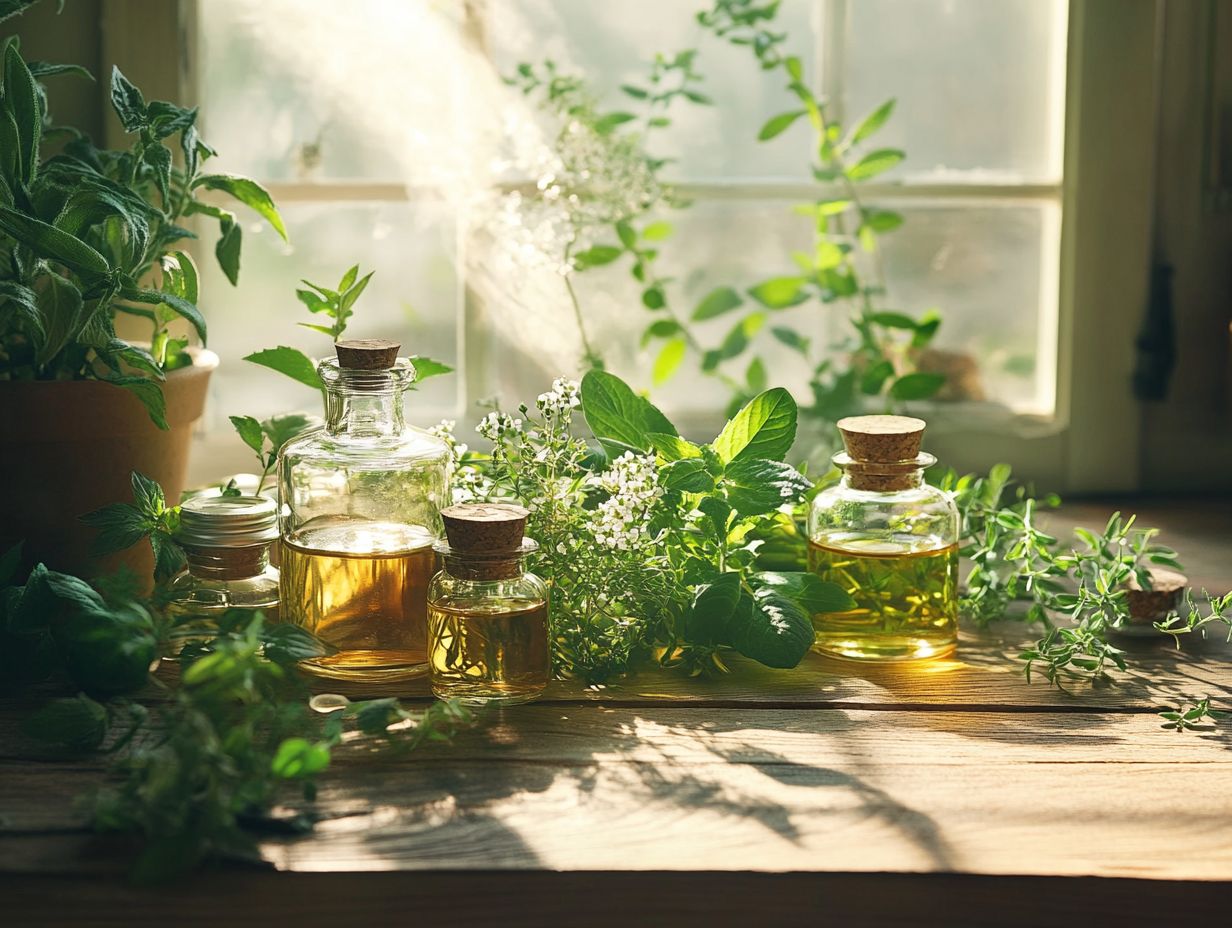
Herbal remedies for skin conditions draw upon the remarkable healing properties of various plants, including licorice root, plantain, witch hazel, Aloe Vera, Turmeric, Chamomile, and Calendula, which offer natural and effective treatments for a myriad of ailments. These remedies target skin issues directly like acne, eczema, and dermatitis, harnessing the soothing and anti-inflammatory effects of herbal ingredients to foster skin healing.
By embracing a holistic approach to skincare, you can incorporate these natural solutions into your routine, achieving healthier skin while sidestepping the side effects often linked to conventional treatments. Act now to incorporate these natural solutions into your routine!
Effective Herbs and their Benefits
Effective herbs such as Aloe Vera, Chamomile, Turmeric, Calendula, and Neem provide remarkable benefits for skin healing. Each herb boasts unique properties; for example, Aloe Vera is renowned for its moisturizing qualities and soothing effects, while Turmeric s anti-inflammatory agents make it an excellent remedy for acne and skin irritations.
Chamomile, with its calming and anti-allergenic traits, can be infused into oils or creams to reduce redness and promote a more even skin tone. Calendula is another valuable option, celebrated for its ability to heal wounds and soothe dry or cracked skin. You might find it in oil form or incorporated into ointments for easy application. For additional benefits, consider trying 5 herbal teas for better skin health as part of your skincare routine.
Neem, known for its purifying and antibacterial characteristics, can be employed in herbal therapies, either as a paste or in powdered form, to tackle various skin conditions like eczema and psoriasis. When you thoughtfully integrate these herbs, including natural remedies for skin infections, into your skincare regimen, they elevate your skin health and add a nurturing touch to your beauty routine. Start exploring these herbs for your skin today!
Using Herbal Remedies for Skin Conditions
Utilizing herbal remedies for skin conditions requires careful preparation and application techniques that truly enhance the benefits of herbal extracts and other natural ingredients, such as natural soap and topical preparations.
Imagine crafting your own homemade soap infused with healing herbs or creating effective topical preparations like ointments and salves. The possibilities for tackling skin issues, including inflammation processes and skin irritations, are virtually limitless.
By mastering the proper use of these remedies, you can elevate your skincare routine with methods that not only promote healing but also combat inflammation and significantly improve your skin s health. Take the first step towards better skin health now!
Preparation and Application Methods
Preparation and application methods for herbal remedies are important for making them work well. Whether you’re using herbal extracts, topical preparations, or natural remedies, understanding how to prepare herbs is essential. You can prepare herbs in different ways, like making drinks (infusions), concentrated liquids (tinctures), or creams (ointments). By mastering the proper application techniques, you can truly tap into the full potential of these natural solutions for skin healing.
This knowledge allows you to target specific skin conditions, such as rosacea or acne, with precision. Incorporating a diverse range of herbs lets you customize your treatments, tailoring your blend to address particular skin types and concerns. For example, harnessing chamomile’s calming properties or aloe vera’s soothing effects can make a world of difference. To enhance your understanding, check out what are the most common herbal remedies. The methods you choose not only affect the potency of the remedies but also determine how well they are absorbed into the skin.
It s vital to familiarize yourself with the intricacies of each preparation method and understand the optimal scenarios for application to achieve the best results. It s also important to conduct patch tests before applying the remedies fully to ensure skin compatibility and avoid any unpleasant reactions.
Safety and Side Effects of Herbal Remedies
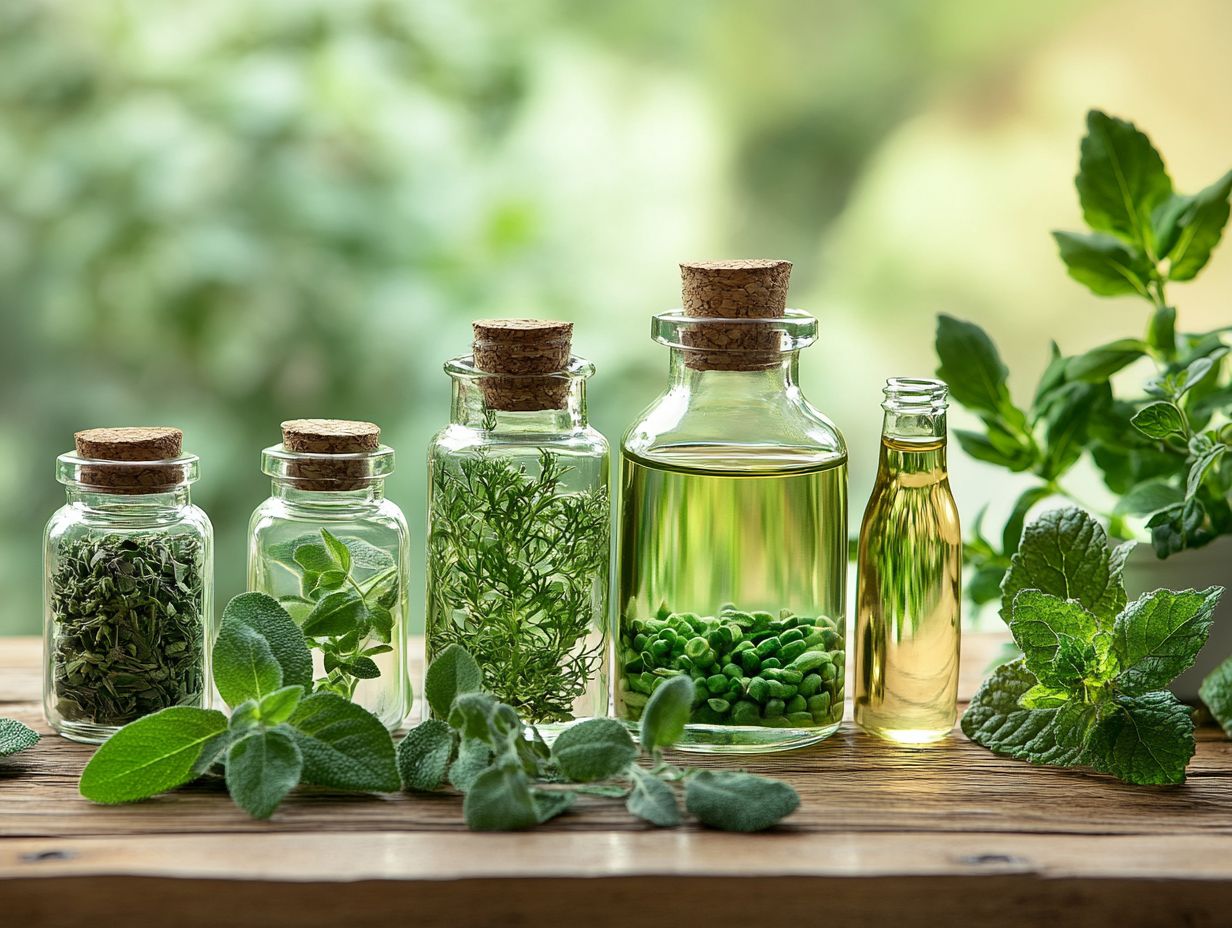
Understanding the safety and side effects of herbal remedies is crucial for anyone contemplating their use. This is especially important if you are dealing with chronic skin conditions or other health issues. While herbal ingredients like aloe vera and chamomile offer numerous benefits, they can also carry risks or interact with other treatments you may be undergoing.
You must assess these interactions now to protect your well-being! This diligence will help ensure that your experience with herbal therapies is both safe and effective.
Assessing Risks and Potential Interactions
Assessing the risks and potential interactions when using herbal remedies is essential for your safety and effectiveness. This is particularly true if you have chronic skin conditions or are already on medication. While herbal ingredients may come from natural sources, they can produce unexpected effects when mixed with conventional treatments. It s crucial to navigate their use with care.
To accurately evaluate these risks, it s wise to consult with healthcare professionals like dermatologists or herbalists. They understand the intricacies of herbal medicine and its interactions with pharmaceutical drugs. These experts can offer personalized guidance, ensuring you are aware of any potential side effects and contraindications related to your specific health conditions.
Additionally, taking the time to research the ingredients is invaluable. Seek out documented studies or reputable sources that discuss both the benefits and risks. This thoughtful approach enhances your safety and promotes a more effective and harmonious relationship between herbal remedies and your existing treatments.
Consulting with a Professional
Talk to a professional to get the best advice for using herbal remedies safely. Expert advice offers personalized guidance and insights tailored specifically to your needs.
Whether you seek the expertise of a dermatologist, herbalist, or naturopath, these professionals can evaluate your unique skin issues and recommend suitable herbal ingredients or treatments. For those exploring natural options, consider the top herbal remedies for skin allergies. This thorough approach ensures safety and effectiveness while addressing any concerns you may have about potential interactions with other therapies.
When to Seek Expert Advice
Recognizing when to seek expert advice is essential for effectively managing skin conditions. You should consult a professional if you experience persistent symptoms, notice a worsening of your condition, or have pre-existing health issues that could complicate your treatment plan. Expert guidance can help you understand herbal treatments better and ensure that they are safe and tailored to your specific skin needs.
It’s also important to remember that not all herbal solutions are suitable for everyone; some may interact negatively with prescribed medications. If you encounter unusual rashes, severe irritations, or allergic reactions, consult a skincare specialist immediately. For more information on safe usage, you can check out what herbal remedies are.
If you re unsure about how to properly use herbs like dosage and preparation methods turning to experts can provide the clarity you need. Regular assessments will help ensure that any underlying health concerns are addressed, allowing you to integrate holistic practices into your routine without compromising your overall well-being.
By taking these steps, you foster a healthier skin journey and highlight the significance of professional insight. Don t wait! Consult a specialist right away if symptoms worsen.
Frequently Asked Questions
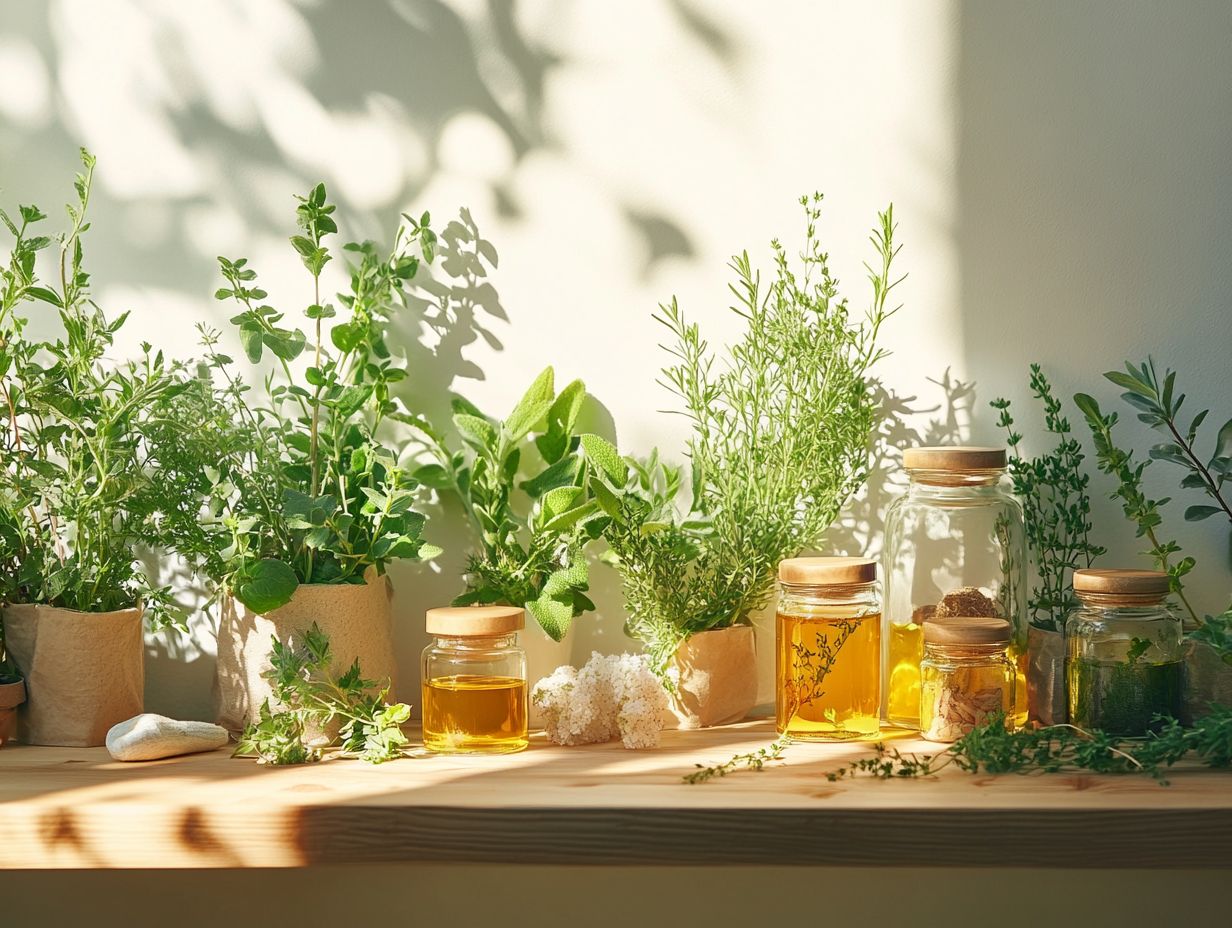
What Are Herbal Remedies for Skin Conditions?
Herbal remedies for skin conditions are natural plant-based products that are used to treat various skin issues. These remedies have been used for centuries and have gained popularity due to their effectiveness and minimal side effects.
What Are the Benefits of Using Herbal Remedies for Skin Conditions?
Herbal remedies for skin conditions have numerous benefits. They are gentle on the skin, provide long-term relief, and are often more affordable than prescription medications.
What Are Some Common Herbal Remedies for Skin Conditions?
Some common herbal remedies for skin conditions include aloe vera, tea tree oil, calendula, turmeric, and neem. These ingredients have anti-inflammatory, antimicrobial, and soothing properties that can help treat a variety of skin issues.
Are Herbal Remedies Safe to Use for Skin Conditions?
Generally, herbal remedies are safe to use for skin conditions. However, everyone’s skin is different and may react differently to certain ingredients. It is always recommended to do a patch test before using any new herbal remedy on your skin.
Can Herbal Remedies Be Used for All Types of Skin Conditions?
No, herbal remedies may not be suitable for all types of skin conditions. It is important to consult with a healthcare professional or a trained herbalist to determine which remedy is best for your specific skin issue.
How Long Does It Take for Herbal Remedies to Work on Skin Conditions?
The effectiveness of herbal remedies for skin conditions may vary depending on the severity of the condition and the individual’s response. Some people may see improvement within a few days, while others may take a few weeks to notice a difference. Consistency and patience are key when using herbal remedies for skin conditions.

